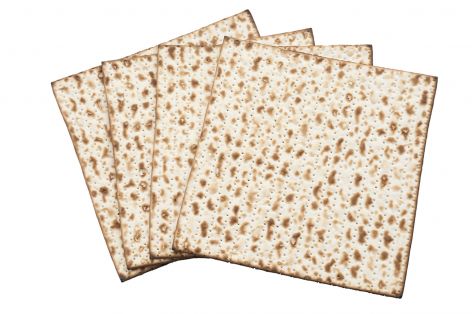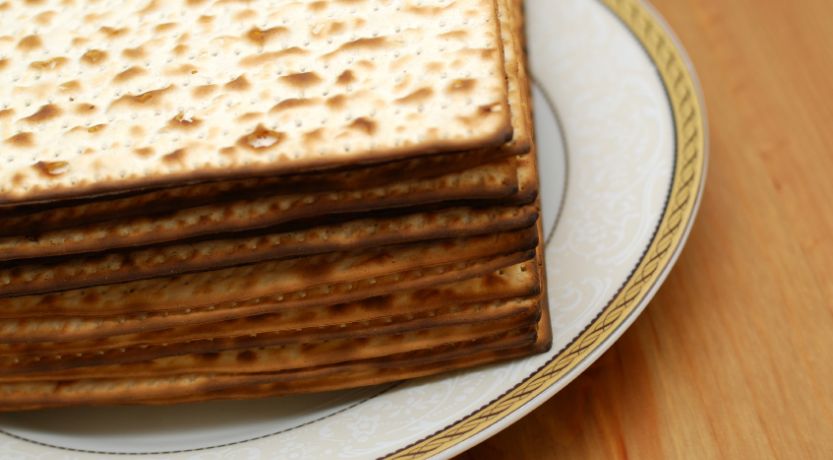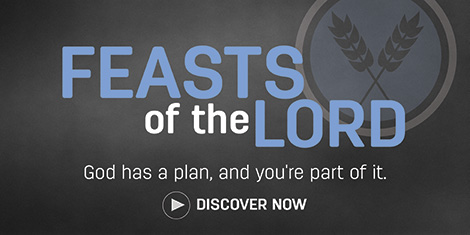For Tuesday, 18th. April, 2017, but posted late!!
What the Biblical Spring Festivals Mean to Us
“The people behind this site don’t keep the traditional spring holidays like Easter. Here’s an inside look at the days we do keep and why they mean so much to us.

We remove all leaven from our homes and often recruit our children to help and to learn the lessons of the festival.
What words come to your mind when you think of spring? You may think of things like bunnies and Easter egg hunts.
But those aren’t the things that come to my mind. I think of things like Passover, leavening, deleavening and matzo.
Since these may be foreign concepts or sound Jewish to some of our readers, I’d like to explain what these things mean to me—and the tens of thousands members of the Church of God, a Worldwide Association—the people behind Life, Hope & Truth.
As Christians, one of our distinctive practices is observing the seven annual festivals outlined in Leviticus 23. For us, these are more than just holidays that come around once a year; our lives center on these days.
It all begins with the spring festivals, then moves on a few weeks later to Pentecost. We then push through the hot summer months leading to the fall festivals, and then endure the cold winter, starting all over again in the spring. (Of course, for our brethren in the southern hemisphere, the seasons are reversed.)
That is how I measure time every year.
As I write this, we are gearing up for the two early spring festivals: Passover and the Feast of Unleavened Bread.
Let me explain what these days mean to us.
The Passover—a memorial to our Savior
For our Jewish friends, the Passover symbolizes the Exodus of the Israelites from ancient Egypt. That’s because in the Old Testament, the Israelites were told to observe this day as a memorial of their deliverance from Egypt (Exodus 12:11-14). But why do thousands of Christians keep the Passover today?
For us the events of the Exodus foreshadowed what Jesus Christ would do nearly 1,500 years later. Just as God freed Israel from bondage in Egypt (following the death of the firstborn from which the Israelites were spared by the blood of the Passover lambs), God offers freedom to us from an even greater form of bondage—slavery to sin (Romans 6:6, 15-18). We can only be released from that bondage through the death of Jesus Christ (Ephesians 2:13; Hebrews 9:14).
In fact, the Bible directly connects the Old Testament Passover to Jesus Christ: “For indeed Christ, our Passover, was sacrificed for us” (1 Corinthians 5:7, emphasis added). We continue to keep the Passover with the symbols that Jesus instituted the night before His death (Matthew 26:26-28; 1 Corinthians 11:24-25).
We don’t approach the Passover lightly. Before we gather to observe the Passover, we go through a period we often call our pre-Passover self-examination. We examine our lives in the weeks leading up to the Passover to identify and strive to overcome our sins and analyze where we need to grow (1 Corinthians 11:28; 2 Corinthians 13:5).
This year (2017) we will observe the Passover after sunset on the evening of April 9. This might seem a bit confusing because technically the Passover is on April 10. In biblical time reckoning, though, days begin and end at sunset. So although we are observing the Passover on the evening of April 9 according to the Gregorian calendar, we are actually observing it at the beginning of the next day, the 14th of Abib, according to the Hebrew calendar.
As Christians, one of our distinctive practices is observing the seven annual festivals outlined in Leviticus 23.
The Feast of Unleavened Bread—putting sin out and putting righteousness in.
Immediately following the Passover, we keep the Feast of Unleavened Bread for seven days (Exodus 12:17-18; Leviticus 23:6). That may sound like a strange name for a festival, so let me explain.
Leavening is an ingredient that causes breads to rise, or puff up. Examples of leavening are yeast, baking powder and baking soda. For seven days we literally remove all leavened products from our homes because the Bible tells us to: “For seven days no leaven shall be found in your houses” (Exodus 12:19).
Of course in ancient times, when people lived in small, simple dwellings, this was relatively easy. Today with larger homes filled with furniture and plenty of nooks and crannies, removing leavening can be a bit trickier!
We search out the big leavened products—loaves of bread, pancake mixes, bagels, baking soda—and make sure those are gone by the time the feast begins. But we also try to be diligent in getting out as much of the remnants, or crumbs, of leavening as we possibly can.
So if you knock on our doors over the weeks approaching April 11, you may find our stoves pulled out of place and us on our knees vacuuming up any crumbs that might have fallen behind them during a year of cooking. You may also see us in our driveways tediously vacuuming out our cars, trying to suction up as many crumbs as is humanly possible.
You may think this sounds (and looks!) a bit odd, but we do this for a reason. The Bible compares leaven to sin (1 Corinthians 5:8). As we clean under our sofa cushions or between the seats of our cars, we don’t just think about crumbs, we think about our lives. As we clean out the obvious things, we think about the very obvious sins that we need to purge from our lives. When we use the narrow vacuum attachment to get the small crumbs out from under our car seats (probably the most awkward place to vacuum with any degree of accuracy), we think about all the seemingly small sins in our lives that we need to search out and purge.
But that’s not all there is to it! The Feast of Unleavened Bread also teaches us to eat unleavened bread for that week (Leviticus 23:6). So that’s what we do. We eat bread that has no leavening in it whatsoever!
 What does that mean?
What does that mean?
Well, generally speaking, unleavened bread is very flat—making pita look like a slice of Texas French toast! The most typical kind of unleavened bread is matzo (specially made for this time of year). A matzo looks like an abnormally large cracker—and generally doesn’t win many taste competitions. That being said, it is edible, and there are many ways to prepare it that are reasonably decent. Some people even enjoy the taste. I like to spread butter and melt cinnamon sugar on it and sometimes even make it into a pizza (definitely not Chicago style, though).
But before I get too carried away with matzo preparation tips, it’s more important to discuss what the matzos (and other forms of unleavened bread) mean to us.
We already covered the fact that during these seven days, leavened bread symbolizes sin. Unleavened bread symbolizes the exact opposite—righteousness. The apostle Paul described it as “the unleavened bread of sincerity and truth” (1 Corinthians 5:8). It’s all about putting off sin and putting on righteousness(Colossians 3:9-10). It’s about living like Jesus Christ, the “bread of life” (John 6:35).
When we eat those crunchy pieces of matzo, or the occasionally softer homemade variety, we try to think about how our lives should be just like the flat substance we are eating: just as our bread is devoid of leaven, we should be devoid of sin.
Two pieces of a bigger puzzle
The special days I’ve described in this post are the first of seven annual festivals we keep every year. Seven weeks after we keep the Feast of Unleavened Bread, we will observe the Feast of Pentecost. Then in the fall, we will observe the Feast of Trumpets, Day of Atonement, Feast of Tabernacles and Last Great Day (or Eighth Day). These days are also loaded with meaning to us.
But we will save those explanations for another blog post in another season.”
From: https://lifehopeandtruth.com/life/blog/what-the-biblical-spring-festivals-mean-to-us/
We would love for you to learn more about these days that mean so much to us. Check out our video series “The Feasts of the Lord” at the Learning Center on Life, Hope & Truth.
________
The Feast of Unleavened Bread: Pursuing a Life of Righteousness.
“How does God want us to respond to Christ’s awesome, merciful sacrifice for us? The Feast of Unleavened Bread shows us how to respond.

The troubles and suffering in this world are caused by sin—the breaking of God’s holy, good and beneficial laws. Jesus Christ was willing to give His life to save us from sin’s death penalty. His sacrifice was the first step in God’s plan to save us from sin and death, and it makes all the other steps possible.
But how does God want us to respond to that awesome, merciful sacrifice? Would He be pleased, having broken us free from enslavement to sin (as the Israelites were enslaved in Egypt), to have us willingly go back to sin again? Or would He much rather have us learn to look at sin as He does and to strive with His help to avoid it at all costs?
The Feast of Unleavened Bread comes immediately after the Passover and teaches us lessons about how we should respond to Jesus Christ’s gracious sacrifice.
Deliverance from slavery to sin
After years of harsh slavery in Egypt, the people of Israel were overjoyed to leave Egypt during the Feast of Unleavened Bread. Egypt and its leader, Pharaoh, serve as a symbol of sin and Satan.
But soon Pharaoh pursued the Israelites, trapping them at the Red Sea. He didn’t want them to be free, just as Satan doesn’t want us to escape from his clutches. Israel was helpless, as are we. Our strength is not sufficient.
But God provided the Israelites a way to escape—directly through the Red Sea! And He offers us a way out through His miraculous help. The apostle Paul explained that the Red Sea served as a type of baptism, the beginning of the conversion process made possible by God’s help (1 Corinthians 10:1-4).”
More at: https://lifehopeandtruth.com/life/plan-of-salvation/feast-of-unleavened-bread/
________
Update.
With the Passover celebration and the Feast at the church on Tuesday we haven’t got much work done on the mini-house. Then we spent quite a bit of time gathering more trash, mostly broken glass from the yard at Roni’s place, (now mine) as that trash man will pick it up if we carefully enclose it in the strong feed sacks that we are using.
Quite a few of us gathered at the church for the service for the last day of The Feast of Unleaverned Bread on Tuesday the 18th, which is also my daughter’s birthday. On Monday we worked on the mini-house and in the afternoon I went to a doctor all the way down in Spring TX, so I knew I wouldn’t have time to cook. So I made a Gefiltre Fish Loaf and Matzos Ball Soup on the Sunday before, then stored it in the fridge until I took it to the church on Tuesday. An elder brought a beef brisket in a crockpot, and we heated up the beef taco left overs from Saturday Sabbath in another crockpot so that there would be no work involved as that day is considered a High Day Sabbath until dusk. Even most of the salad was prepared ahead of time, just a few tomatoes to chop up.
Once home, as soon as the sun set, I ate some raisin toast and cookies for the first time for a week, as they both contain leavening. The pastor’s favorite saying was to jokingly say at each Passover Feast of the Unleavened Bread meeting was “Where’s The Cookies?’ But I didn’t really miss them, and I didn’t lose any weight during that seven days either, so it’s not the cookies around my middle!
The Bible Readings were Lev.23:6-8, ( “6 On the fifteenth day of that month the LORD’s Festival of Unleavened Bread begins; for seven days you must eat bread made without yeast. 7 On the first day hold a sacred assembly and do no regular work. 8 For seven days present a food offering to the LORD. And on the seventh day hold a sacred assembly and do no regular work.’ ”), and Num. 28:16-25 and 1 Cor 5:6. The Teaching was about First Fruits, and how the “Root” (Jesus) supports us.
We all had a great time during the service and in the dining hall with our friendship and fellowship, so it was a great Feast’s last day.















No comments:
Post a Comment